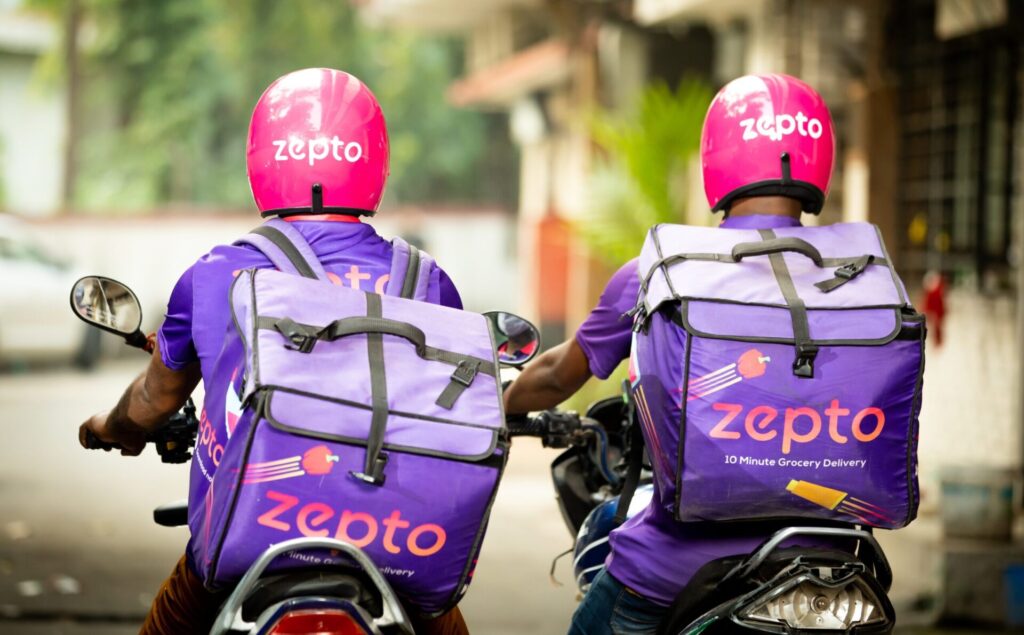The grocery delivery industry is experiencing significant growth, driven by shifting consumer behaviors and increased access to online shopping platforms. One notable player in this field is Zepto, a Mumbai-based startup that offers 10-minute grocery delivery services. With the rise of digital convenience, Zepto’s business model has gained attention, making it a major contender in the rapid delivery market. The Zepto business model capitalizes on providing quick, reliable service for consumers with busy schedules who lack the time to shop in physical stores.
Zepto

Zepto was founded by Aadit Palicha and Kaivalya Vohra, two teenage Stanford dropouts who recognized a problem during the pandemic—they had difficulty getting groceries delivered efficiently. In response, they launched Zepto in September 2020, and by April 2021, it had become fully operational. Zepto offers a unique grocery delivery experience, promising that essentials will reach customers’ doorsteps within 10 minutes. While some businesses offer 30-minute delivery, Zepto’s edge lies in cutting that time to a third, making it a pioneer in hyper-fast delivery.
Also Read: Astrotalk Business Model
Zepto Business Model
| Aspect | Details |
| Full Name | Zepto |
| Founders | Aadit Palicha, Kaivalya Vohra |
| Founded | September 2020, started in April 2021 |
| Headquarters | Mumbai, India |
| Industry | Grocery Delivery |
| Background | Developed by teen Stanford dropouts to address grocery delivery challenges during the pandemic |
| Website | www.zeptonow.com |
The Dark Store Business Model
Zepto’s success is largely attributed to its use of the “dark store” model. Dark stores are essentially distribution hubs closed to the general public, designed solely to fulfill online orders. The Zepto business model leverages these dark stores to ensure groceries are picked, packed, and delivered with incredible speed. This method has proven successful in helping retail businesses survive and thrive during the COVID-19 pandemic.
The grocery delivery sector in India is projected to grow to over $24 billion by 2025, with online grocery sales accounting for 3-5% of the market by then, compared to less than 1% previously. Zepto’s dark store approach allows it to meet this growing demand by strategically placing small warehouses close to consumer hubs. These dark stores are optimized for quick navigation and packing, which makes them highly efficient. Zepto’s AI-powered systems further enhance its inventory management, ensuring orders are fulfilled quickly and accurately.
Zepto’s ability to deliver over 2,500 products within just 10 minutes is key to its rapid growth. This speed not only satisfies consumer expectations but also builds brand loyalty, helping the company scale up in a highly competitive market.
The Contactless Shopping Approach
The pandemic has accelerated the shift towards contactless shopping, and Zepto’s dark store model fits perfectly within this trend. Customers can order their groceries online without needing to visit a physical store or interact with store personnel. Once the order is placed, it is promptly delivered, creating a smooth and safe shopping experience. This model has become particularly appealing to consumers who prefer minimal physical contact in the wake of health concerns.
Expanded Reach and Efficiency
The dark store strategy has allowed Zepto to expand its customer base by ensuring that distribution hubs are located near densely populated areas. This proximity helps reduce delivery times and makes the service more attractive to consumers. Additionally, because these dark stores operate purely for delivery purposes, they are “open” around the clock for online orders, providing constant availability.
The company’s focus on inventory management is also crucial to its efficiency. Zepto’s dark stores are designed for optimal order fulfillment, with easy-to-navigate layouts and AI-driven tools for tracking product availability. This not only ensures that orders are completed swiftly but also helps Zepto maintain a diverse product range that appeals to various customer preferences.
Effective Distribution Mechanisms
Zepto’s dark store model gives the company significant control over its distribution network. With cold and micro warehouses, Zepto can cater to specific market segments by ensuring that groceries are delivered fresh and promptly. This control over the distribution chain allows Zepto to operate more effectively, making it a dominant force in the online grocery delivery sector.
Zepto’s Revenue Model
The Zepto business model generates revenue primarily through commissions on orders placed through its app. Typically, Zepto charges a 2-3% commission on the total order value, which helps cover operational costs. Additionally, Zepto may charge a small delivery fee for providing its rapid delivery services.
Over the years, Zepto has raised substantial funding, including more than $360 million through various investment rounds. Its most recent Series D round, held in May 2022, brought in $200 million, pushing the company’s valuation to around $900 million. This strong financial backing positions Zepto as a potential unicorn in the making, especially considering its remarkable growth trajectory.
In the last quarter, Zepto’s revenue surged by 800%, while its burn rate per order dropped significantly. With monthly growth of 50%, industry experts predict that Zepto could reach a valuation of $1 billion by the following year.
Also Read: 5 Creative Business Ideas Under 10 Lakhs
Conclusion
Zepto’s impressive growth is supported by a strong business model, innovative use of dark stores, and strategic investments. In its latest funding round, the company raised $100 million, bringing its valuation to $570 million. The founders have expressed confidence that these investments will help Zepto expand its customer base and improve its services. Operating primarily in India’s major metropolitan areas, Zepto continues to grow by earning commission fees on each order placed through its app and delivering on its promise of 10-minute groceries. As the Zepto business model evolves, it is well-positioned to capitalize on the growing demand for quick and reliable grocery delivery services.
Discover more from PahadiSuvidha: Explore Travel, Culture, Food & Local News
Subscribe to get the latest posts sent to your email.


